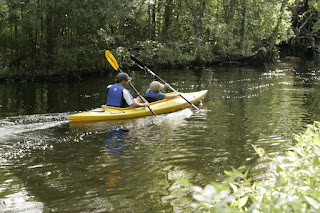by Michael H. Wasserman
The sun sets majestically over your new vacation home. Your attention focuses on the gentle wind blowing thru the trees. The blissful payoff for a long long week at work. The calm evaporates when you open the letter – a cease and desist order from a neighbor’s lawyer. You are directed to stay off their property, which puzzles you. You’ve never once set foot on their land, barely even know which place is theirs.
You've only been at you new place and the river. Yet this, my friend was your downfall. The neighbor does not want you to boat past his place.
Turns out, owning riverfront property does not necessarily confer access right upstream or down. The neighbors might have a thing or two to say about it too. In these circumstances, absent permission, taking your new paddle boat downstream into town might be a trespass.Adam Holm learned this lesson the hard way, in a decision handed down by the Illinois Appellate Court last month.
WHAT HAPPENED?
The Mazon River is known for large deposits of fossils thought to be more than 300 million years old. They have attracted much attention in fossil hunting circles for going back to the civil war era. The Holms own two pieces of property along the Mazon in Grundy County. One landlocked, that is, there is no road access to it and one with road access. The Holms engaged in a fossil hunting business using both of parcels of land. They would drop kayaks in the river from their road-accessible lot, paddle down to the inaccessible lot and then exit further along at the Pine Bluff Road Bridge. Peter Kodat, who also runs a fossil hunting business owns another piece of property on the Mazon somewhere along this portion of the river. He organized a couple of other neighbors to join him and sign written trespass notices prohibiting the Holms from kayaking on their portions of the river. At one point Kodat went so far as to have the Grundy County Sheriffs arrest Holms for trespass. Holms sued them all for the right to access the whole river, free of trespass. Both the trial court and the appellate court ruled against him. Their kayaking actions were indeed trespasses.
SO, SO, HOW DOES SOMEONE OWNS A RIVER (OR THE RIGHT TO USE IT)?
Generally, ownership and usage of bodies of water fall into the realm of Riparian Rights. Riparian rights extend to all water-ways, rivers, lakes and oceans. The underlying principals are found in common law created long ago. Many of the cases relied on for precent are from at best the earliest decades of the 20th century. Notably, this decision is said to be the first riparian rights opinion this century.
In Illinois, the general rule is that an owners access to land bounded by a stream extends to the mid-point of the riverbed and along the entire shoreline of their property. The public however is given a navigation easement in waters which are navigable in fact.
A river or stream is navigable in fact if is “of sufficient depth to afford a channel for use for commerce” by customary modes of transportation. A river is not navigable even if that streams is large enough for rowboats or small launches!
All parties to the case agreed that Mazon River is non-navigable. Accordingly, there is no public easement for passage. Kodat and the other neighbors each owned to the mid-point of the river and each could individually or collectively bar the Holms from using their parts of the river.
FINAL THOUGHTS:
Riparian rights are usually come into play more in agricultural and industrial contexts relating to the use or diversion of water. But, as more and more of us – and our clients – become interested in the recreational use of waterways and rural living, these issues will come up more and more frequently.
Anyone thinking of buying land that has a water feature – and the brokers helping identify possible parcels should be aware of this case. Not all waterways include access. Not all owners get access to the entire waterway.
Understanding whether a river or stream is navigable or not might save you – or your client – from the ruin of a perfectly good lemonade or sunset.


